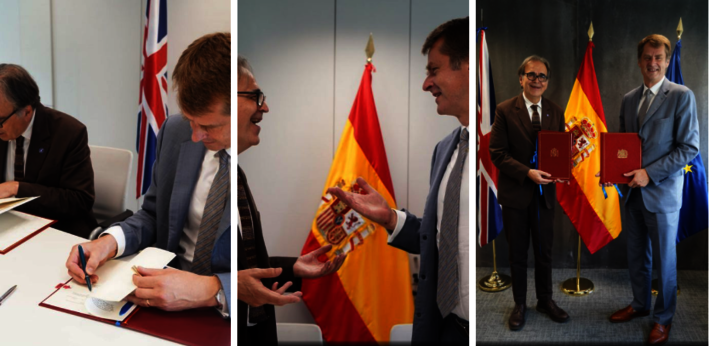You are here
Home ›01/07/2020
Europe - Covid-19 update - 1 July
This post is to keep UK institutions updated on disruptions across the EU Europe region caused by the Covid-19 pandemic. For more information, updates, webinars and other engagement opportunities, please see ‘Europe and education: Stay connected during Covid-19’.
These posts focus on ten priority countries: Bulgaria, Cyprus, France, Germany, Greece, Italy, Ireland, Poland, Romania and Spain. This week: Germany, Greece, Ireland and Romania.
- Germany: Smaller states developing study grants for badly affected students; Abitur results being released state-by-state
- Greece: Core subjects for pan-hellenic exams completed, special subjects to end by 10 July, with results 10-15 July
- Ireland: New minister for Higher Education, Research and Innovation appointed
- Romania: Initial bacalaureat results published.
If a country you’re interested in doesn’t appear here, or if you would like more details, please check the previous weeks’ updates or contact the country representative.
- 24 June: Bulgaria, Cyprus, Germany, France, Romania, Spain
- 10 June: France, Germany, Ireland, Romania, Spain
- 3 June: France, Germany, Greece, Ireland, Italy, Romania
- 27 May: France, Germany, Ireland, Italy, Romania, Spain
- 20 May: Bulgaria, Cyprus, Germany, Greece, Ireland, Poland, Romania, Spain
- 13 May: Cyprus, France, Germany, Italy, Ireland, Romania, Spain
- 6 May: Bulgaria, Cyprus, France, Germany, Greece, Romania
- 29 April: Cyprus, France, Germany, Greece, Italy, Poland, Romania
- 22 April: Germany, Greece, Spain
- 16 April: Bulgaria, Cyprus, France, Romania
- 8 April: Bulgaria, Cyprus, France, Greece, Italy, Poland, Romania, Spain
IELTS tests have been affected in all countries in Europe as a result of Covid-19 precautions. For the latest update by country, please check: https://www.ielts.org/news/2020/changes-to-ielts-test-arrangements-in-some-locations-due-to-novel-coronavirus. We are monitoring the situation very closely and will continue to provide updates as the situation develops.
For more Europe updates, webinars, market insights and other services in international higher education, please go to your alerts settings and select updates by region from Europe.
If you have any feedback, please contact me or any of the country staff listed below.
Thank you - and stay safe.
Almut Caspary – Higher Education and Research Lead, EU Europe (Almut.Caspary@britishcouncil.org).
Updated 29 June
Important note: Education in Germany is largely devolved to the 16 federal states. This means that although there are agreed Germany-wide principles, there are differences in dates of exams, holidays and regulations for schools and higher education institutions. Public health measures are also in the hands of state governments and local authorities, creating an increasingly mixed picture across the country as lockdown restrictions are eased at different paces depending on local case numbers and severity of infections. In some areas of the country increased relaxation of measures have led to occasional flare-ups in cases. One such incident a fortnight ago at a factory led to quarantine regulations in the immediate vicinity being tightened in the midst of a general loosening of measures.
On 27 June, at a global summit entitled 'Global Goal: Unite for Our Future', Chancellor Angela Merkel announced Germany’s commitment of a further €383 million to fight Covid-19. The funds will go towards the development of vaccines, tests and medicines and the accessibility of these worldwide.
Germany has launched its contact-tracing App 'Corona-Warn-App'; as of 29 June it had been downloaded 14 million times. Despite a few teething issues, the Robert Koch Institute (Germany’s public health body) say they are encouraged by engagement with the tool. The app needs at least 15 per cent of the population (12.48 million) to participate to be effective.
School and university closures
Primary and secondary schools and universities have partially reopened with reduced class sizes and distancing regulations. In all states, kindergartens have reopened.
Summer holidays are staggered in the 16 German states, the first starting this week in Berlin and three other states. All federal states have agreed that school pupils should return to school after the summer break with some measures to avoid new infections or keep them to a minimum. Proposals include pupils in static groups and alternating these groups across two weeks, with one week at school in person and the other learning from home. The number of cases after the break will determine whether this is feasible in each state.
University applications and admissions processes for the 2020-21 intake are starting. However, there are differences across the country with regard to the approach to reopening universities. The majority are expecting to teach mostly online until the end of the year, while others are planning to allow students to return to campus in the autumn. Some universities are also considering a delayed the start to the winter semester. Professors across the country have signed an open letter petitioning for a return to face-to-face teaching at universities. Other groups, including school-leavers and politicians, are also advocating a quick return to face-to-face teaching at universities.
One of the less populous states has asked its six publicly funded universities to return some of the agreed increase in their budgets for the years 2022-24 to the state government in order to offset the Covid-19-related budget deficit.
Many states are planning voluntary face-to-face 'summer school' programmes to help school students from lower socio-economic backgrounds catch up on content they may have missed if they lacked the technological or other means to fully participate in online classes.
Examinations
Students can decide themselves if they want to take their university exams or not. This means, of course, that universities have to offer them. Some HEIs are therefore renting huge exhibition halls in order to comply with social distancing regulations, while others are moving the majority of their exams online, sometimes using online-proctoring services.
Abitur (A-level equivalent) grades are gradually being issued. The date depends upon the federal state. Berlin is issuing results now, while others may only receive them in July.
Financial and academic support
Higher education students who are struggling financial are able to apply for grants of up to €500 for each of June, July and August and interest-free loans of up to €650 per month under a scheme by the federal Ministry of Education. As of 25 June 25, 58,000 applications had been received, with the number expected to ris. If every application were to be approved, the cost in June would total around €24.5 million. Total available funds are €100 million.
One smaller state, Hessen, is developing measures to support students currently receiving study grants and loans by extending the official 'standard period of study' by one semester. This means that affected students will be eligible to receive financial support for longer.
Regarding vocational education, the federal government has set up a scheme to support SMEs that provide vocational training or apprenticeships and are considerably affected by the crisis. The core offer is a bonus for enterprises of between €2,000 and €3,000 per trainee. The scheme has a total budget of €500 million.
Other insights: UK in the media
There is continued coverage of the high number of Covid-19 cases and deaths in the UK as well as the economic impact and the government’s reaction to the crisis.
Stalling Brexit negotiations between the UK and the EU are also a regular feature in the news. The former German ambassador to the UK gave a widely quoted interview urging the German public not to look down on the UK in which he expressed that he is hopeful that a deal is still possible: www.spiegel.de/politik/ausland/brexit-deutscher-ex-botschafter-warnt-vor-zu-selbstgefaelligem-blick-auf-grossbritannien-a-0e50fbd5-de82-4b1a-b7cc-eef28f56577c (in German).
Contact
For more information about Germany, please contact Ailsa Kienberger (ailsa.kienberger@britishcouncil.de).
Updated 30 June
Examinations
Core pan-hellenic (national) examinations are now completed. Subject-specific examinations such as music, design and foreign languages are taking place between 1 and 10 July. More than 100,000 students took part in this round and 77,970 are expected to access higher education in Greece.
Grades are expected to be released between 10 and 15 July. As soon as the results are announced we will notify you about the performance trends in each subject.
Students are expected to submit their applications stating their preferences by Friday 17 July.
Contact
For more information about Greece, please contact Maria Tsakali (Maria.Tsakali@britishcouncil.gr).
Updated 29 June
Ireland’s new coalition government (a-three way agreement between Fianna Fail, Fine Gael and the Green Party) was sworn in on Saturday 27 June. The new cabinet includes a new Minister for Higher Education, Research and Innovation. This is a significant change and should enable some of the commitments to higher education set out in the Programme for Government document to be achieved. Previously responsibility for higher education was held by a junior minister within the Department of Education. The move has been warmly welcomed by many organisations including the Union of Students in Ireland and the Irish Universities Association. The new minister is Mr Simon Harris TD who is viewed as a capable and ambitious minister.
Ireland moved to Phase 3 in its lifting of lockdown restrictions on Monday 29 May. Much of the economy has reopened today, including pubs serving food, cafés, restaurants, hotels, hairdressers and beauty salons, tourist attractions and remaining retail outlets. Gyms, swimming pools, leisure centres, museums, galleries, churches and creches can also reopen.
School and university closures
The academic year for third level and post primary education has ended. The academic year for primary education will end this week. ‘July Provision’, additional time in school for primary students with special educational needs, will take place over the summer.
Examinations
The predicted grades process for final school exams is underway. A common approach by third level institutions has been agreed for Leaving Certificate candidates taking subjects out of school where the predicted grade process could be not be applied. An automatic exemption for these subjects will apply.
Student financial support
The issue of student accommodation on campus has been highlighted as on ongoing issue. Most students from the 2019-20 academic year have received partial refunds for their campus accommodation costs. However, it is not clear what system will be in place for 2020-21 and there is concern among the student body. Universities have confirmed that there will no reduction in tuition fees charged for 2020-21.
Remote and online academic provision
Several universities have announced some details of their plans for the first term of the 2020-21 academic year. Many are indicating that some face-to-face teaching will take place with social distancing measures. For example, THEA has announced that face coverings will be mandatory for all students and staff who return to campus buildings in September.
Communication with students
A number of HEIs have called publicly for prospective students to not defer their places from the 2020-21 academic year, though there is no joined-up campaign on this.
British Council activity in country
The British Council office is closed though all team members are working remotely.
Further information
9thlevel.ie: Regularly pdated digest of articles related to higher education in Ireland, also with articles with a Northern Ireland focus.
Contact
More more information about Ireland, please contact Mags Walsh mags.walsh@ie.britishcouncil.org.
Updated 30 June
Romania has seen an increase in cases in recent weeks after the Covid-19 lockdown was relaxed. As a result, the group of experts who help manage Romania's pandemic response decided not to go ahead with the further relaxation measures that were planned for 1 July.
Examinations
The results of the bacalaureat exam were published on Tuesday on the website of the Ministry of Education and Research. Approximately 155,500 candidates registered for the written tests, of which approximately 123,800 candidates were taking the test for the first time and 31,800 candidates were resits.
232 students managed to obtain an average of 10 (the highest possible mark), and 92,930 obtained averages over 6 (the average needed to pass). This session's pass rate is 62.9 per cent (before appeals), whereas the usual pass rate (in 2018 and 2019) is just over 67 per cent.
The best results were obtained this year by students from the county of Cluj (77.8 per cent), while the pass rate in Bucharest was 67.5 per cent. Appeals can be submitted by noon on 1 July. The final results will be published on 5 July.
Contact
For more information about Romania, please contact Gabriel Ivan (gabriel.ivan@britishcouncil.ro).
- Bulgaria: Ivaylo.Slavov@britishcouncil.bg
- Cyprus: pantelitsa.michael@cy.britishcouncil.org
- France: Catherine.Saracco@britishcouncil.fr
- Germany: ailsa.kienberger@britishcouncil.de
- Greece: Maria.Tsakali@britishcouncil.gr
- Italy: Filomena.Casamassa@BritishCouncil.it
- Ireland: Mags.Walsh@ie.britishcouncil.org
- Poland: Julia.Plachecka@britishcouncil.pl
- Romania: gabriel.ivan@britishcouncil.ro
- Spain: Carolina.Jimenez@britishcouncil.es






